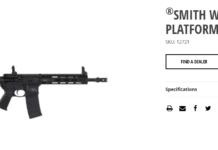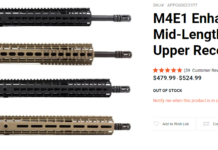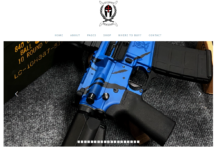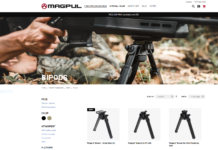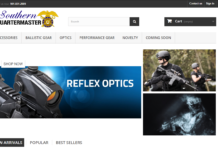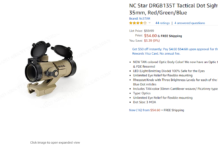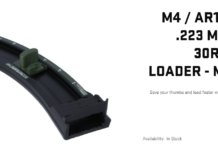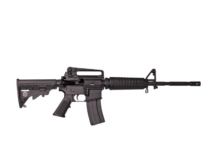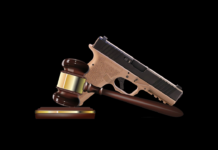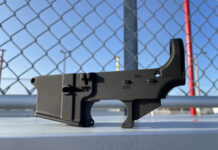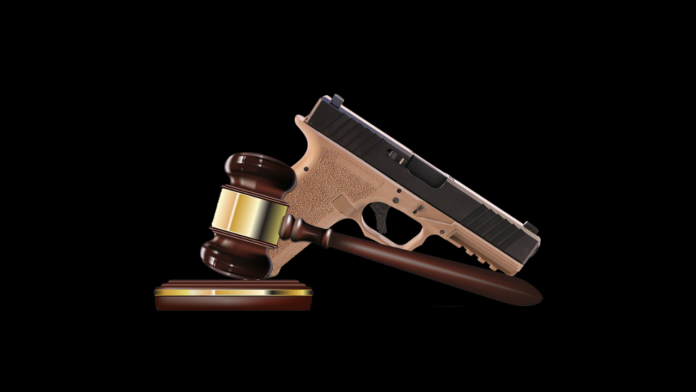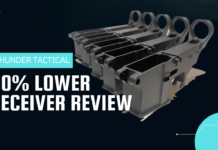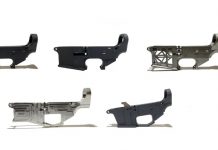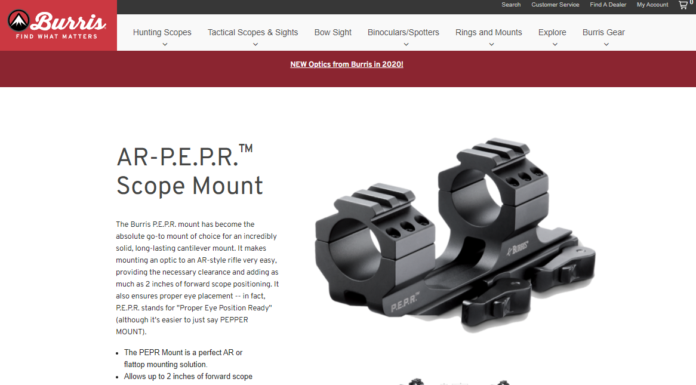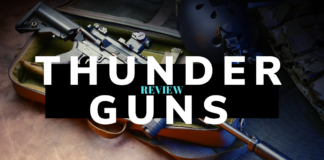As of right now, in the State of Florida, it is legal for any person to manufacture their own firearm. However, several Florida legislators have made attempts at criminalizing the manufacture of ghost guns across the board. Tin Polsky, a Florida state senator argues that the law hasn’t kept up with technology.
“There was no such thing as a 3D printer 10 or 20 years ago. There was no such thing as ghost guns that were assembled, purchased on the internet,” Polsky said during a conference to announce the filing of a bill to delegalize ghost guns.
Democratic Representative, Christine Hunschofsky, filed a bill (HB 527), late last year, in 2021, to make the manufacture of unfinished receivers illegal by anyone who is not licensed to manufacture firearms.
The manufacture of unfinished frames is legal in the state of Florida, yet despite this, the Florida Department of Law Enforcement has not come out with an official report as to the effects of ghost guns in the state. While this is true, there are very clear statistics on gun crimes in the state as a whole.
In a statistical report done by the Everytown for gun safety fund, it was shown that Florida ranks 31st in gun violence in the whole United States. Over half of gun related deaths in the state, at a whopping 63%, are from suicide. 35% of the deaths by firearms are homicides which is 3% under the national average at just 38%
As the evidence toward the claim that ghost guns are used in a large number of criminal cases is lacking, the claim that ghost guns are more dangerous than the serialized firearms that make up these statistics may not be educated. This does not only encompass the state of Florida as there are no official statistics on the result of ghost guns or the rate of gun related crimes in the United States.
Can you trace ghost guns?
A trace of a firearm can take place from a number of times during the initial transfer of a firearm. That is, from the time it is manufactured, the time it is sent to an FFL license holder, to the time it is transferred to its original owner. The National Tracing Center or NTC is the only organization permitted to conduct an ATF trace of a firearm for a law enforcement agency involved in a bona fide criminal investigation. In order for a trace to be conducted, the firearm must have a serial number and have been logged in by the licensed manufacturer and a licensed dealer.
Since ghost guns are manufactured by unlicensed people, it is impossible for the ATF to conduct an ATF trace on one. While this is true for all unserialized guns, the same can be said for guns that do have serial numbers as well.
ATF traces only work on serialized firearms involved in crimes. From the trace, law enforcement agencies are able to gather the information of the initial transaction of the firearm they are investigating. That is, the time and place of the transaction, as well as the original buyer. Any other information the law enforcement agency needs about the firearm will have to be ascertained through other methods during the investigation.
The NTC is the only organization authorized to conduct traces on firearms. Even the state law departments of law enforcement must go to the NTC, a federal organization to conduct the search of a firearm only if it is a part of an investigation of a crime. The information of firearms transferred through the NTC is not public, and is illegal for the NTC to give to anyone unless it falls into the criteria above.
Can Felons Own Ghost guns?
No. This is a huge misconception. Pursuant to the Gun Control Act of 1968, the act set into law after the assassination of JFK, it became illegal for any felon to own a handgun. The federal law regulates rifles much less than handguns, as rifles are involved in only 3% of gun murders, per a study done by Pew Research.
In the case of Ghost guns, which are still legally considered firearms, the Gun Control Act of 1968 still stipulates that any person who is a felon may not own one. The law is different in no other state, as the act is a federal one.
States are, however, able to regulate the laws of transfers of firearms, and therefore are able to set stipulations for people with felony convictions to regain their rights to own firearms.
Because Ghost guns are legally considered firearms, the laws regulating firearms apply to them as well. Unless the ghost gun is a handgun, the right of a felon to own a ghost gun is up to the state’s admittance of it, granted the felon has met all requirements, if any, to gain that right back.
Are Ghost Guns Made of Plastic?
Technological advancements in gun manufacturing since the 1950s had led to a boom in firearms manufactured with composite materials. The joint efforts of metallurgical and composite advancements have allowed gun manufacturers to work with cheaper yet stronger materials.
In the case of Ghost guns, polymer has become a popular material, making up many of the 80 lower handgun frames, as well as a portion of the 80% lower rifle frames like those of the AR platform.
People do not need to buy these frames in order to build them however, as 3D printed guns are on the rise. Also known as “downloadable guns,”These are guns that can be made from home, using a 3D printer and/or a Computer Aided Drafting (CAD) system.
Depending on the state in which one resides, they may be able to download a 3D model of a firearm in multiple pieces, to mill out the receiver, grip, and stock with purchased composite material. 3D printed guns are much cheaper in comparison to polymer or metal ghost guns, however they lack in quality otherwise.
Are Ghost Guns Legal?
The federal government recognizes the ownership of unfinished receivers, as a legal method for the eventual ownership of firearms. As stated by the ATForganizations website,
“Receiver blanks that do not meet the definition of a “firearm” are not subject to regulation under the Gun Control Act (GCA). ATF has long held that items such as receiver blanks, “castings” or “machined bodies” in which the fire-control cavity area is completely solid and un-machined have not reached the “stage of manufacture” which would result in the classification of a firearm according to the GCA.”
The legality of ghost guns, or in particular: guns without serial numbers, the legality per state changes. These implements may either be outright banned or heavily regulated by their respective states.
Here is a list of states that either regulate or completely delegalize 80% lowers:
New Jersey: In a letter written to gun manufacturers, the State Attorney General, Ger Grewal demanded the halt of all sales of 80% lowers and any other receiver blanks in New Jersey.
New York: Like New Jersey, The Attorney General of New York, Letitia James submitted a letter of Cease and Desist to the top 80% lower stores in the United States.
Washington: The Washington state legislature passed a bill banning untraceable firearms. This bill also targeted undetectable firearms which could not be detected by metal detectors. While the law doesn’t outright ban 80% lowers, it bans ghost guns made mostly of polymer. The resulting effect, online 80% lower stores have stopped selling to residents of the state.
Connecticut: 80% lowers were made illegal in the Constitution state after the state legislature passed a bill banning the sale and ownership of unserialized receiver blanks. The bill also bans all unserialized firearms. Because they aren’t issued serial numbers by the ATF, 80% lowers can not be bought and owned in the state. Period.
Washington DC: The “Ghost Guns Prohibition Emergency/Temporary Amendment of 2020,” an emergency bill passed by the mayor of DC amends the district’s Official Code 7-2501.01 which includes 80% lowers and frames in a list of prohibited firearms. In the area, because of this bill, 80% lowers can not be owned by its residents.
Rhode Island: The Julie Cardinal Act bans the sale and ownership of ghost guns and includes the sale of 80% lowers or unfinished frames that can be made into functioning firearms. This bill was passed by the Rhode Island State Legislature as the result of a shooting that took place in the state in 2020. It was rushed to the state legislature amidst the emotional response to the victim’s shooting.
Hawaii: The Bill HB 2744 H.D. 1 S.D. 2, prohibits the manufacture, purchase, or otherwise acquisition of firearms parts for the purpose of making a functioning firearm with no serial number. In this case, not even licensed individuals could make 80% lowers in the state. This law also bans the process for 3D printed guns as well as 3D printed guns themselves.
Where are 80% lowers legal?
80% lowers are federally legal, so any state besides the six states and one district mentioned above are locations where it is completely legal to buy, own, and manufacture ghost guns. It is, however, illegal to manufacture a ghost gun with the intent to sell it as anyone wishing to sell firearms this way must have a valid FFL license.
Where are Ghost Guns made?
Ghost guns can be made in any facility with the necessary tools to build them. However, the act of building 80% lowers into complete guns without a serial number by a licensed gun dealer is illegal according to ATF regulation. That is because the serial number of every firearm sold by a licensed vendor must be submitted for a background check.
Ghost guns are most commonly made from the homes of their owners, as they are typically purchased from online websites. However, many ghost gun builders will use their privately owned machine shops to get the work done.
Why are Ghost Guns legal?
Ghost guns are recognized by the federal government as well as all of the state governments. Ghost guns themselves are legal because of the second amendment, however, the law for how they are acquired can be regulated by state governments. In some states where ghost guns are not legal, it is not even an option to purchase an 80% lower gun to have it serialized at a later date.
The 2nd amendment is the driving force for all aspects of gun ownership, including the aspect involving gun building. While it can be argued that states are able to regulate the acquisition of certain firearms because there is precedent for it in the federal law, it is actually an impediment of the 2nd amendment to criminalize the act of at-home manufacture of firearms, whether or not they are serialized.
Ghost guns are legal because they share no differences in federal law with their serialized counterparts. And in execution, there is no official statistical report done by any state agency on the effects of ghost guns as compared to serialized guns.
What do Ghost Guns look like?
Ghost guns do not have an official appearance. They look like any gun you might already find in gun stores around the US. That is because ghost guns are typically made from already existing models of firearms, namely the AR15 and a series of Glocks models.
What are Ghost Guns made of?
Ghost guns come in a variety of different shapes and sizes. They are DIY guns after all. Ghost guns are typically either made from a combination of metals and polymers.
Here is a list of the kinds of materials you may find in common ghost guns.
Aluminum: aluminum is a cheap and durable material key in one of the most popular models for ghost guns, the AR-15. The lower receiver, upper receiver, and the handguard are typically made using aluminum.
Steel: Steel is the main component of all barrels in firearms because it is the most durable and resistant to rust. Stainless steel is a common feature in most barrels made for firearms in general, however, when it comes to DIY guns, barrels can be made with different finishes.
Polymer: Polymer is apparent in almost all ghost guns, especially those made by a 3D printer. The frames of ghost guns that have very little firing power can be made with polymer, however, the upper or slide will typically always be made of steel or aluminum.
Wood: Wood is a less common material used in the making of ghost guns. That is because many of today’s firearms are no longer made with wood, which is prone to expansion and compression during certain times of year. While a bit stronger against abrasive forces, wood is more prone to erosion over time than polymer because it is an organic material.
Ghost Guns and The Current Law
Though the current law does recognize ghost guns, as several pieces of legislation legitimize its manufacture and ownership, they are still under fire. Even in states with relatively no gun control like Texas, we have seen a push against the AR platform, one of the most common DIY guns out there.
In 2019, the former Texas Congressman said in a debate during the 2019 Presidential Campaign, ““Hell yes, we’re going to take your AR-15, your AK-47…”
In most states, the law of ghost guns coincides with the federal law, which holds that ghost guns are completely legal to manufacture by unlicensed people. What is regulated however is the sale of firearms by unlicensed people. Though it is legal to enact the private sales of firearms in most states, It is not legal for an unlicensed person to sell an unserialized firearm they manufactured. This is duly expressed in the Gun Control Act of 1968.
The current law of ghost guns is not a loophole, but a series of regulations with precedent set in the 1960s, as well as the second amendment itself. The 2nd Amendment is as follows:
“A well regulated Militia, being necessary to the security of a free State, the right of the people to keep and bear Arms, shall not be infringed.”
What does the Second Amendment mean for Ghost guns?
The second amendment does not really sound suited for the building of ghost guns. The truth of the matter though, is that the second amendment does not give any powers to the government to regulate the ownership of firearms. This means if there is a factor inhibiting the ownership of a firearm to such a degree that building one would be the only way to own a gun, it would be an infringement on the second amendment to prohibit its manufacture.
Furthermore, Ghost guns are firearms, and as such, are regulated as firearms. The main pieces of legislations regulating firearms are not in the constitution,
Conclusion
Building guns at home has been in the American DNA ever since our inception and is one of the most popular outdoor hobbies out there. While this is simply a growing industry, it’s been a target for law enforcement for quite some time, with emphasis on “if the guns don’t have serial numbers on them, they can’t be traced”. This, in fact, doesn’t make the firearm more deadly. It only means that you can not track the firearm to the retail store where it was the initial purchase made.
The second emphasis is on individuals purchasing the DIY build kits and being able to make a fully functional firearm without a background check. A criminal motivated to use a gun to harm someone, will likely have no moral values and will obtain the gun one way or the other. This is all proven by the data after data, on surveys, studies and analysis on the topic done by government agencies and research groups to identify the root cause of the problem. The premise of banning homemade guns is outrageous and as building a gun is not going to prevent a crime as criminals can use a few sections of pipe and nail to build a homemade shotgun, which are not complicated machines.
Also Read: Anderson 80% Lower Review








